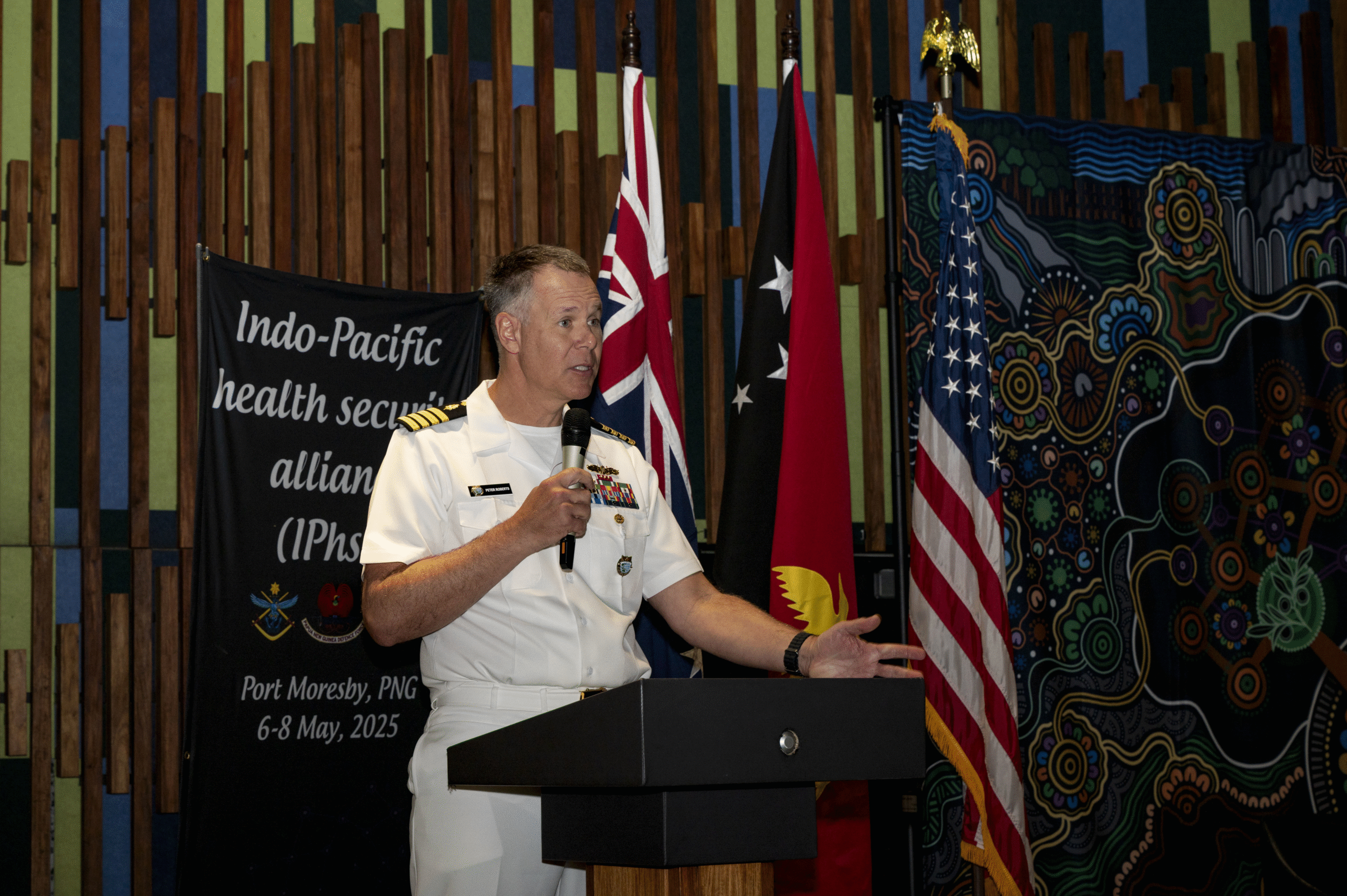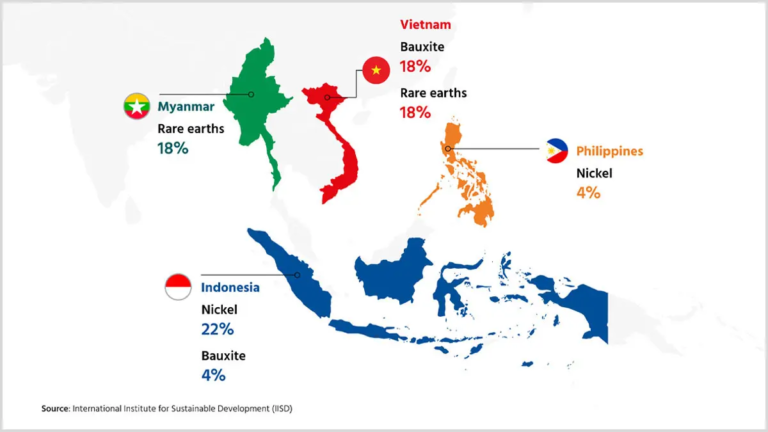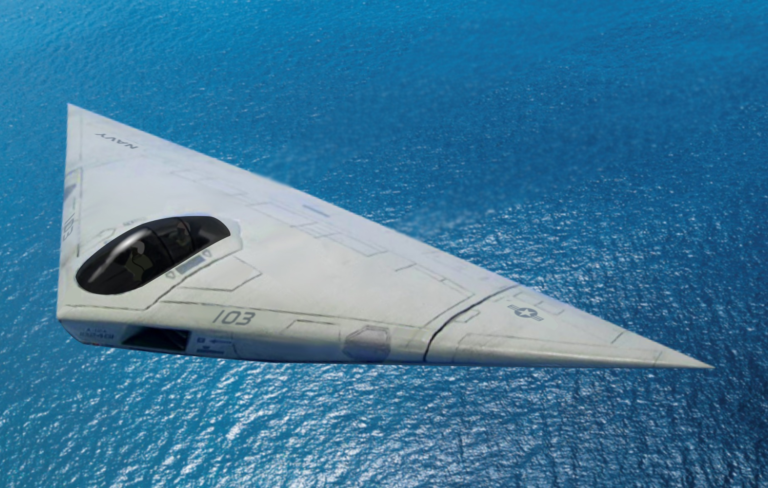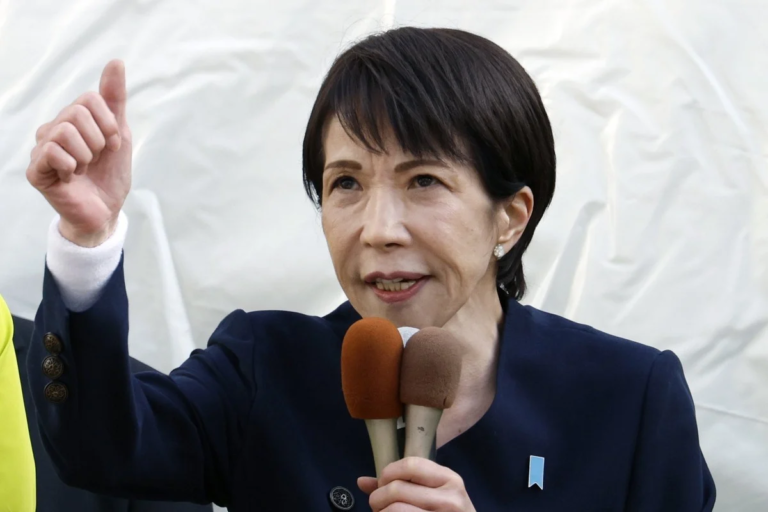
Papua New Guinea (PNG) hosted a key Indo-Pacific health security alliance (IPhsa) event with co-chairs the Australian Defence Force (ADF) and the United States Indo-Pacific Command (USINDOPACOM) in Port Moresby in early May 2025.
The multilateral event celebrated PNG’s 50 years of independence and brought together 150 representatives from more than 15 Allied and Partner nations to enhance collective readiness against health security threats. Representatives from international organizations and nongovernmental organizations also participated.
IPhsa, founded in 2022, “is a platform for unity and resolve — a coalition of like-minded defence forces, health leaders, and humanitarian actors brought together under the shared understanding that health security is national security,” PNG Defence Force (PNGDF) Director of Health Services Lt. Col. Peter Kaminiel said, reiterating the theme of the 2025 event, “Health Security is National Security: Civil-Military Collaboration Against Health Threats.”
The PNGDF formally joined Australia and the U.S. in IPhsa during the meeting and more Indo-Pacific nations plan to join the alliance in the coming year.
Joining IPhsa “affirms our commitment to interoperability, to resilience, and to the collective protection of our people,” Kaminiel said. “We see IPhsa as a strategic platform to elevate our capability, strengthen our partnerships, and deepen our contribution to regional stability.”
The IPhsa meeting improved coordination and collaboration between military and civilian sectors, which is essential for robust planning and preparedness. Besides PNG, participants hailed from Australia, Fiji, Indonesia, Japan, Malaysia, New Caledonia, New Zealand, the Philippines, Samoa, Singapore, Tonga, Vietnam and the U.S.
“Collectively, defence, and security sectors can bring unique capabilities to support our civilian partners and our broader region, but more work is needed to fully understand, harness and integrate those strengths. Initiatives like this meeting are instrumental in building that cooperation,” Royal Australian Air Force (RAAF) Air Commodore Nicole dos Santos, RAAF Director of General Operational Health and the Air Force Health Service, said in her opening remarks.
“Since its inception IPhsa has served as a cornerstone of regional health security efforts, embodying its vision to integrate civil-military cooperation and foster sustained health security partnerships,” USINDOPACOM Command Surgeon U.S. Navy Capt. Peter Roberts said at the meeting. “IPhsa has grown into a platform for meaningful collaboration, bringing together diverse expertise to tackle the shared challenges of our time.”
Participants had discussions and conducted a multinational exercise designed to improve coordinated responses to public health emergencies. This exercise focused on clarifying roles and responsibilities, critical coordination processes, and resource contributions during disaster and health emergencies. It also emphasized rapid personnel deployment and the integration of interagency coordination into emergency plans for more effective responses. Each participant returned home with actionable recommendations derived from the exercise.
“We have demonstrated that in the Indo-Pacific, cooperation is not just possible — it is already underway,” Australia’s dos Santos said in closing remarks. “The health threats we face do not recognise our borders, ideologies, or economic status. Our only defence is a coordinated, united, and forward-looking response and in this meeting, that spirit of collective responsibility has shone through.”
This collaboration has strengthened the region’s ability to prevent, detect and respond to health security threats, thereby protecting lives, economies, sovereignty and national security in keeping with IPsha’s goals to build partnerships, counter harmful influences and enhance readiness, contributing to peace, security and prosperity in a Free and Open Indo-Pacific.
IPhsa has demonstrated the power of collaboration in addressing health security challenges. The ADF and USINDOPACOM have worked closely with regional partners to develop the alliance, learning from each partner nation’s best practices to address shared needs and gaps.
IPhsa has co-hosted seven events in the region and virtually, promoting partnership and collaboration in developing country-owned health security capabilities.
“If Taiwanese students or young people were to take to the streets in protest, the CCP (Chinese Communist Party) could respond the same way it did on June 4, 1989 — with tanks and machine guns.”
The crackdown
The Tiananmen Square massacre took place on the night of June 3 and continued into the early hours of June 4, 1989, after weeks of peaceful student-led protests calling for democratic reforms, media freedom and free speech, and other demands.
The Chinese military moved in with tanks and live ammunition to clear the square, killing hundreds — possibly thousands — of unarmed civilians, according to declassified U.S. government documents.
Despite shocking the world, what happened remains a taboo topic in China.
At the time, Li was stationed in northeastern China as head of a radar station under the PLA’s 39th Army Corps, a year after graduating from a military academy. On May 20, his unit was ordered to deploy to Beijing to protect foreign embassies near the square.
As one of the PLA’s elite units, Li’s troops were expected to be among the first to enter Tiananmen and carry out what was described as an “evacuation mission.” But on the night of June 3, their commander Xu Feng (許峰) conducted reconnaissance in the capital and returned saying he had witnessed soldiers firing at protesters.
Li believes Xu had a crisis of conscience and deliberately delayed the unit’s advance. As a result, they remained on the outskirts of Beijing and did not participate in the main assault.
When Li and his fellow soldiers finally entered the square on the morning of June 5, they saw no bodies – only piles of trash, bloodstained clothing, pants with bullet holes and tank tracks.
Breaking the silence
Li, now 61, said he felt compelled to speak out because the Tiananmen massacre was not only a pivotal moment in China’s history, but a warning to the world. “As a member of the Chinese military, I feel I have both the right and the responsibility to tell the truth about what happened,” he said.
Many former protesters and civilians have shared their stories over the years, but Li said he remains the only former PLA soldier to have spoken out publicly.
After receiving asylum in the early 2000s, Li became an Australian citizen. He first shared his account at a 2002 event in New York organized by the NGO Human Rights in China.
“A lot of former student protesters have spoken out. But so far, I’m the only former soldier to do the same,” he said.
A censored memory
Although footage of the massacre was widely broadcast at the time, discussion of it is tightly restricted in China. Li said it was understandable that people inside China may be unaware of what happened, given the country’s strict censorship and lack of access to independent information.
What troubles him more, he said, are overseas Chinese who know the facts but continue to defend the CCP’s actions.
“Having different political opinions is normal in a democracy,” Li said. “But in the face of facts, if you can see the truth and still praise or defend the CCP’s brutal crackdown, then I think you lack humanity — worse than an animal. That is my personal view.”
He said the Chinese leadership drew critical lessons from Tiananmen: to maintain absolute control of the military and to suppress perceived threats before they grow.
“The regime realized that as long as it controls the military, it can protect itself,” Li said. “That’s why China now spends more on domestic ‘stability maintenance’ than on national defense.”
A warning for Taiwan
Li visited Taiwan in 2019 to attend a memorial event marking the 30th anniversary of the massacre, where he met then-President Tsai Ing-wen (蔡英文). He praised Tsai and her administration for bringing international attention to Taiwan’s security challenges.
“We need to bring the Taiwan issue to the world stage,” he said. “Only by internationalizing it can Taiwan’s security be assured.”
Asked why Taiwanese people should care about the massacre, Li said the events of June 1989 are not just part of Chinese history — they are a potential preview of what could happen in Taiwan’s future.
The threat Taiwan faces from China is no longer just rhetoric — it’s now backed by military force, Li said, warning that if China unifies Taiwan by force or other means, it would impose the same authoritarian rules on the island.
“The purpose of looking back is to ensure such tragic events never happen again.”




